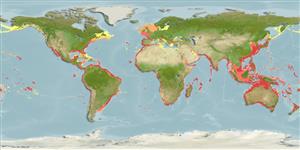Common names from other countries
>
Carangiformes (Jacks) >
Carangidae (Jacks and pompanos) > Naucratinae
Etymology: Naucrates: Greek, naykrates, -es, -es = supremacy in the sea (Ref. 45335).
More on author: Linnaeus.
Environment: milieu / climate zone / depth range / distribution range
экология
морской ассоциированный с рифами; пределы глубины 0 - 300 m (Ref. 86942). Subtropical; 61°N - 43°S, 180°W - 180°E
Circumtropical in tropical seas. Western Atlantic: Nova Scotia, Canada to Argentina (Ref. 7251). Eastern Atlantic: British Isles (rare vagrant), Norway and Bay of Biscay to Namibia, including the Mediterranean and Canary Islands. Eastern Pacific: Vancouver Island (British Columbia, Canada) to the Galapagos Islands (Ref. 2850) and Chile (Ref. 115205). Common throughout the Indian Ocean (Ref. 3197).
Size / Вес / Возраст
Maturity: Lm ? range ? - ? cm
Max length : 70.0 cm TL самец/пол неопределен; (Ref. 5288); common length : 40.0 cm TL самец/пол неопределен; (Ref. 9626)
колючие лучи спинного плавника (общее число) : 5 - 6; членистые (мягкие) лучи спинного плавника (общее число) : 25 - 29; колючие лучи анального плавника: 3; членистые (мягкие) лучи анального плавника: 15 - 17. Body elongate, slender, and not strongly compressed; posterior end of upper jaw located at anterior rim of eye; dorsal fin with 4 or 5 spines followed by another spine and 25 to 29 soft rays (IV-V+I 25-29); lateral line without scutes; caudal peduncle with well developed fleshy keels and with dorsal and ventral peduncular fossae (Ref. 55763). Body dark to pale bluish, with 6-7 broad, dark bars; white tips on caudal lobes and on second dorsal and anal lobes (Ref. 3197).
Oceanic species with a semi-obligate commensal relationship with sharks, rays, other bony fishes and turtles (Ref. 5217). Young are usually associated with jellyfish and drifting seaweed (Ref. 2850, 9563). Feed on scraps of host's left over, parasites and excrement; also on small fishes and invertebrates (Ref. 5288). Eggs are pelagic (Ref. 4233). Marketed fresh and salted or dried (Ref. 9283). Captured at the surface using hand nets (Ref. 26165).
Life cycle and mating behavior
Maturities | размножение | Spawnings | Egg(s) | Fecundities | личинки
Smith-Vaniz, W.F., J.-C. Quéro and M. Desoutter, 1990. Carangidae. p. 729-755. In J.C. Quero, J.C. Hureau, C. Karrer, A. Post and L. Saldanha (eds.) Check-list of the fishes of the eastern tropical Atlantic (CLOFETA). JNICT, Lisbon; SEI, Paris; and UNESCO, Paris. Vol. 2. (Ref. 7097)
Статус Красного Списка МСОП (Ref. 130435)
CITES (Ref. 128078)
Not Evaluated
Угроза для людей
Harmless
Использование человеком
рыболовство: не имеет хозяйственного значения; объект спортивного рыболовства: да; аквариум: общественные аквариумы
дополнительная информация
инструменты
Специальные отчеты
Скачать в формате XML
ресурсы в Интернет
Estimates based on models
Preferred temperature (Ref.
115969): 7.9 - 28.1, mean 20.9 (based on 3025 cells).
Phylogenetic diversity index (Ref.
82804): PD
50 = 1.0000 [Uniqueness, from 0.5 = low to 2.0 = high].
Bayesian length-weight: a=0.01380 (0.00638 - 0.02986), b=2.94 (2.75 - 3.13), in cm Total Length, based on LWR estimates for this species & (Sub)family-body (Ref.
93245).
Trophic level (Ref.
69278): 3.4 ±0.43 se; based on food items.
устойчивость к внешним воздействиям (Ref.
120179): средний (среднего размера), минимальное время удвоения популяции 1.4-4.4 года (Preliminary K or Fecundity.).
Fishing Vulnerability (Ref.
59153): Moderate to high vulnerability (48 of 100).
